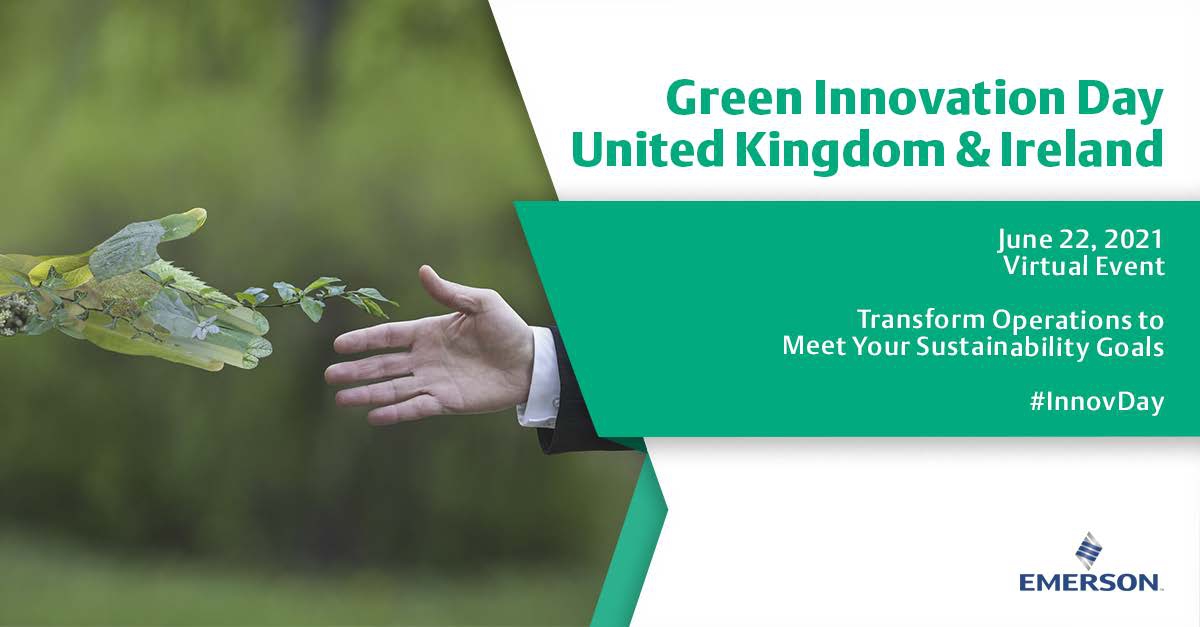Emerson: Innovative automation solutions help meet environmental sustainability goals

A range of pressures are forcing industrial organisations to make a strategic shift in environmental sustainability. Manufacturers must reduce greenhouse gas emissions and comply with tighter environmental legislation or risk exposure to litigation on compliance failure. Both activist and institutional investors are driving low-carbon economic strategies and greater risk aversion, while social pressure from consumers with enlightened environmental awareness has never been greater. As a result, industrial companies are committing to ambitious decarbonisation and environmental sustainability strategies. This includes implementing solutions that enable the use of alternative fuels and low-carbon power sources, the reduction of energy and material use in production systems, and the management and removal of production emissions.
At the heart of these solutions is innovative automation technology that helps to deliver the step change improvements needed. The deployment of measurement technology and monitoring systems helps manufacturers to monitor environmental impact. Real-time energy management information systems automate the process of mapping and managing energy consumption across a site, as it is being consumed. Wireless networks facilitate the easy installation of measurement points across a plant to measure usage, and real-time alerts can notify decision-makers when energy consumption is above expected and actions may be required. For example, Emerson’s Plantweb™ Insight Heat Exchanger application provides in-depth monitoring of shell and tube heat exchangers by analysing plant sensor data and delivering predictive diagnostics that help operators maintain optimum performance and energy efficiency.
Increasing energy efficiency and reducing consumption can be intrinsically linked with process control and optimising the performance of process control loops. Poor tuning leads to greater process variability. In turn, operators tend to run the plant away from the most efficient regions. For example, in a feed heater this could mean a higher temperature setpoint and higher energy consumption. Emerson is addressing this issue by providing a range of tools and services that can help achieve significantly better control performance. Among these is the DeltaV™ Loop Service, which is designed to help users maximise the number of automatic and well-performing control loops, leading to greater product quality and throughput, fewer operator interventions on-site, and increased energy efficiency.
In addition to continued energy efficiency improvements and reductions in emissions, industrial companies must also transition to alternative fuels to ensure they meet their low carbon objectives.
Hydrogen is emerging as the fuel of the future and new infrastructure is required to meet increased demand, including large-scale electrolysis production using renewable or low-carbon energy sources. Providers of electrolysis technology are looking at ways to scale up and improve their designs. These will need to handle higher current density and provide high efficiency over a longer lifetime. Digital twin technology, that provides a software-based replica of the physical assets of a production facility, is proving to be an invaluable tool, enabling the analysis of various ’what if’ design scenarios, such as different rectifiers or water purification systems, and different balance of plant design improvement ideas. Digital twins can also validate the optimised control and safety schemes, and prove essential in the area of regulatory compliance.
Whilst not only committing to a 20% reduction in greenhouse gas emissions from its own operations by 2028, Emerson is also engaging and partnering with universities and research centres, industry sector associations and government bodies around the world to develop policies and innovative solutions to our sustainability challenges. Advanced automation technology will have a key role to play in helping companies achieve their sustainability goals and as a global provider of automation products, solutions, expertise and services, Emerson is ideally positioned to partner in developing strategies that create step change improvements in environmental sustainability.
As part of these efforts to support industrial companies, we are hosting a series of virtual events entitled ’Green Innovation Days’, which aim to provide insight into ways of transforming your operations to meet your environmental sustainability and net zero decarbonisation targets. The latest online event will take place on the 25th May, with our subject matter experts explaining how innovative automation technologies can help change the way you measure, monitor and control emissions; drive energy performance through improved control; ensure the supply and purity of hydrogen to fulfil downstream requirements; maximise the use of lower cost waste and alternative fuel sources by mitigating process issues; improve energy use by optimising unit and equipment performance with real-time monitoring; gain fewer outages and extend maintenance cycles through improved control for biomass energy.
To help fit in with your busy schedule, the Green Innovation Day, which includes a mix of presentations and demonstrations, has been condensed into just 90 minutes. You can view the complete agenda and pre-register:
Click on the below link for more information:
| Email: | uksales@emerson.com |
| Website: | www.emerson.com |

| Telephone: | 0870 240 1978 |
| Email: | uksales@emerson.com |
| Website: | https://www.emerson.com/en-gb/automation/home |
| More information on the Emerson Process Management Ltd BVAA Member Directory Page |
Search related valve / actuator articles: Emerson Process Management LtdIssue 63Miscellaneous







-web.jpg)





